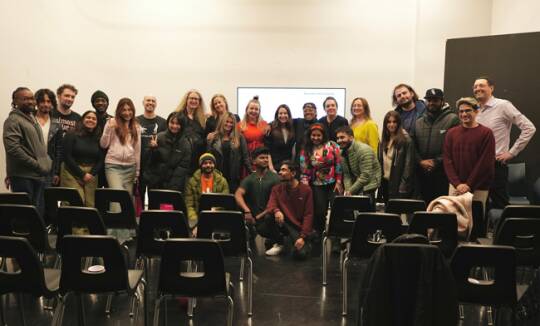
So, you’ve decided to pursue more schooling, and have now found yourself stuck at the crossroads of higher education, overwhelmed by choice. This can lead to questions such as:
- What is a bachelor’s degree?
- What’s the difference between a bachelor of arts and a bachelor of science?
- How long does it take to get a Bachelor’s degree?
Rest assured, you’re not alone in this quest for clarity. A significant number of students embark on their Bachelor’s degree journey without a full understanding of the essential requirements, benefits, and considerations involved.
In this comprehensive guide, we’ll explore everything you need to know about bachelor’s degrees in 2023.
You’ll learn about the differences between various types of bachelor’s degrees and the costs of pursuing them. We’ll also dive into the diverse career opportunities they can lead to.
Let’s get started!
What Is a Bachelor’s Degree?
A Bachelor’s Degree is an undergraduate academic degree awarded by a college or university upon completion of a specific course of study. It is typically the first degree that students earn, requiring four years of study in a specific field of study.
It represents a substantial commitment to higher education and offers a multitude of advantages for individuals seeking personal and professional growth.
Types of Bachelor’s Degrees
Before embarking on your educational journey, it’s essential to explore the different types of bachelor’s degrees available. The three most common types are:
1. Bachelor of Arts (BA)
A BA degree focuses on humanities and social sciences programs and aims to cultivate critical thinking and communication skills. It offers a broad-based education that can be applied to various careers. BA Majors may include:
- History
- Psychology
- English
- Communications
- And more
2. Bachelor of Science (BS)
A BS degree specializes in technology, mathematics, or natural sciences and is designed to develop your quantitative and analytical skills. It provides a more focused education in comparison to a BA and is ideal for careers in STEM (Science, Technology, Engineering, and Mathematics) fields. BS Majors may include:
- Biology
- Chemistry
- Finance
- Computer Science
- And more
3. Bachelor of Fine Arts (BFA)
A BFA degree is tailored for individuals passionate about fine, visual, or performing arts and aims to nurture creativity and artistic proficiency. It offers specialized education ideal for careers in fields like theatre production, museum curation, and more. BFA Majors may include:
- Creative Writing
- Theatre
- Drawing
- Graphic Design
- And more
What about a Bachelor of Creative Arts Degree (BCA)?
In your research, you have also come across what is referred to as a “creative arts degree” or a Bachelor of Creative Arts Degree (BCA).
In the realm of higher education, creative arts degree programs are increasingly gaining traction. These programs typically teach a blend of technical creative skills and business know-how, preparing students for a diverse range of career opportunities in the creative industries.
Yorkville University’s Unique BCA Offering
Yorkville University’s Bachelor of Creative Arts (BCA) program stands out for its comprehensive yet accelerated approach. It is a degree completion program, meaning it allows diploma-holding students the opportunity to earn a bachelor’s degree in just 15 months.
Here’s what makes it so special:
- Beyond Artistic Skills: The program blends arts education with leadership, entrepreneurship, and project management, equipping you for both creative and business roles.
- Flexibility and Skill Development: Offered both online and on-campus, the BCA program caters to a wide range of artistic backgrounds. It focuses on imparting a breadth of skills, from fundraising to ethical collaboration, setting you up for long-term success in your chosen field.
Why Choose Yorkville?
Yorkville’s BCA program is industry-driven, and designed to help you thrive in today’s creative industries. For international students, it also serves as a pathway toward a Post-Graduation Work Permit (PGWP).
Bachelor’s Degree Requirements
To embark on the journey of earning a bachelor’s degree, you must meet certain requirements, which may vary between educational institutions. Here are some common prerequisites:
Application Requirements:
- High school diploma or GED: Completing high school education is a standard requirement when it comes to applying for a bachelor’s degree
- Past grades or GPA: Some programs require a minimum GPA or a high school grade average. This is typically somewhere between 70-90% depending on the program.
- Standardized test scores: While some schools are moving away from this, many schools in the states will take into consideration a student’s SAT or ACT scores.
- Letters of recommendation: It’s common for bachelor’s degree programs to request that their applicants submit a letter of recommendation from a teacher or mentor.
- Personal essays: It is often requested that students hand in a personal essay, allowing application committees to better understand your motivations and goals.
Graduation Requirements:
In most Canadian provinces, students generally need to complete 120 credits over 3-4 years to earn a bachelor’s degree right after high school.
However, there are some exceptions:
- In Quebec, students who complete CEGEP (a pre-university program) can finish a bachelor’s degree in 90 credits over 3 years
- Second degree students may also only need 90 credits if they have applicable credits from a previous degree
- Some specialized programs like engineering may require up to 150 credits over 5 years
The Cost of a Bachelor’s Degree
Understanding the cost associated with pursuing a bachelor’s degree is essential for financial planning. Several factors influence the cost:
Range of Tuition Fees
Tuition fees for bachelor’s degrees in Canada can vary significantly depending on the university and program you choose. According to Statistics Canada, on average, Canadian students enrolled full-time in undergraduate programs pay around $6,834 per year. Meanwhile, international students can expect to pay higher tuition fees, with an average of $29,714 per year. However, it’s important to note that tuition fees can range from $20,000 to $30,000 annually
Online Bachelor’s Degrees
Choosing between online and on-campus bachelor’s degrees depends on your individual circumstances. Consider the following factors:
- Flexibility: Online degrees are flexible, allowing you to balance work and education. On-campus programs offer extracurricular activities and in-person interactions.
- Affordability: Online degrees tend to be more cost-effective due to lower overhead costs.
- Accessibility: Online programs allow you to study from anywhere with an internet connection, making education accessible for students in remote areas or with mobility constraints.
Is a Bachelor’s Degree Worth It?
The decision to pursue a bachelor’s degree hinges on various factors, including your career goals and personal aspirations. Here are some key benefits:
Higher Earning Potential:
College graduates typically earn significantly more than those without degrees. According to the Social Security Administration, in the U.S., men with bachelor’s degrees earn approximately $900,000 more in median lifetime earnings than high school graduates, while women with bachelor’s degrees earn $630,000 more.
Enhanced Job Prospects:
Many high-paying jobs require at least a bachelor’s degree. The National Center for Education Statistics reports that over 87% of 25 to 34-year-olds with a bachelor’s degree or higher were employed in 2022, compared to 68% of the same demographic who held a high school diploma only.
All in all
A bachelor’s degree represents an investment in higher education that can provide individuals with personal growth and expanded career opportunities.
While weighing factors like time commitment and cost, research still shows that earning a BA, BS, BFA, or BCA correlates with higher lifetime earnings, lower unemployment, and increased access to jobs requiring college credentials.
Good luck on your educational journey!
Level Up Your Creative Career Today!
Already hold a creative diploma?
Yorkville University’s Bachelor of Creative Arts is a degree completion program that lets you leverage your diploma to earn a bachelor’s degree in just 15 months.
The BCA program was designed to equip you with the skills needed to make a significant career advancement, whether that means stepping into a leadership role within your industry or launching your own creative venture as an entrepreneur.
Sound interesting? Speak with one of our admissions advisors for more information.
Chat with an Admissions Advisor now
What is a Bachelor’s Degree FAQ
It usually takes four years to complete a Bachelor’s Degree program, although the length of time may vary depending on the institution and the specific program of study.
Earning a Bachelor’s Degree can provide a number of benefits including better job opportunities, higher earning potential, and a greater depth of knowledge in a specific field of study. It can also serve as a prerequisite for graduate programs.
Yes, many colleges and universities offer online Bachelor’s Degree programs. This allows students to earn their degree from the comfort of their own home and provides flexibility in scheduling.
The main difference between a Bachelor of Arts and a Bachelor of Science degree lies in the area of study. A Bachelor of Arts degree typically focuses on subjects within the humanities, social sciences, or arts, while a Bachelor of Science degree usually emphasizes subjects within the natural sciences or technical fields.
Yes, colleges and universities both offer Bachelor’s Degree programs. The specific institution you choose will depend on your personal preferences, academic goals, and area of study.
A Bachelor’s Degree can open up a wide range of job opportunities depending on the field of study. It can also serve as a foundation for further academic pursuits such as earning a Master’s Degree or a Doctorate.
A Bachelor’s Degree is a higher academic degree than an Associate degree. While an Associate degree typically requires two years of study, a Bachelor’s Degree requires four years and offers a more comprehensive education in a particular field.
A Bachelor’s Degree is an undergraduate degree, while a Master’s Degree is a graduate degree. A Bachelor’s Degree is typically the first degree that students earn, while a Master’s Degree requires further study beyond the undergraduate level.
Yes, many colleges and universities have articulation agreements that allow students to transfer credits earned from an Associate degree program to a Bachelor’s Degree program. This can help streamline the path to earning a Bachelor’s Degree.






